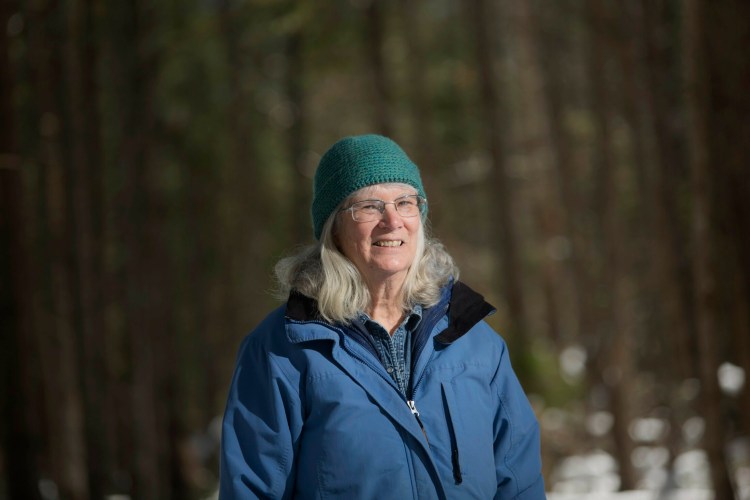Editor’s note: 2019 Source Awards judge and MOFGA Executive Director Sarah Alexander recused herself when we discussed and voted on this nomination.
Jean English did not grow up with a big garden or with a parent who loved to garden or in a neighborhood dotted with bountiful gardens. There were big trees behind her house in a suburb of Boston, trees her parents specifically directed the builder not to cut down, and she grew up in their shade. “I think growing up in a house where the upstairs bedrooms were in the canopy of maple trees, that was probably influential,” she says today.
English went on to get a Ph.D. in plant and soil sciences and to teach college students organic gardening, soil fertility and sustainable landscape horticulture. She worked briefly for the Cooperative Extension in Eastern Kentucky. For the last 34 years, she and her husband have run a self-described “tiny” farm in Lincolnville, raising cut-your-own Christmas trees, tree stock for Fedco, produce for their own table — and a son and a daughter. (When we phoned English earlier in April, she was fretting that she hadn’t yet started her tomatoes. Her current favorite: Chateau Rose.)
But if you are a Mainer and familiar with her name, it’s probably because since 1988, English has been editor of the Maine Organic Farmers and Gardeners quarterly newspaper, with a readership of 60,000. Whether she is reviewing a gardening book or explaining lasagna gardening, heirloom apple trees or sweet potatoes, her articles are practical, erudite, meticulous and encouraging.
It’s hard to overstate the importance of MOFGA to the state’s farms and farm-to-table renaissance. And it’s hard to overstate English’s role in disseminating useful, sometimes pointed information to the state’s farmers, gardeners and homesteaders. For more than 30 years, she has been a constant, quiet champion of organic growing in Maine. English is the recipient of our 2019 Pollinator Award.
Mary Pols, the lead writer for the Source section in the Maine Sunday Telegram for five years, said whenever she had an idea for a farming story, she’d research the topic to see what had previously been written on it. English, Pols said, always got there first.
Case in point: this 2002 editorial for MOFGA, written seven years before first lady Michelle Obama looked out at the South Lawn of the White House and dreamed of a vegetable garden. “What if politicians took time to grow and savor some of their own food?” English wrote. “This topic came up at our dinner table one night, when I was comparing the intense interest that Thomas Jefferson had in agriculture and horticulture with the apparent absence of such among many politicians today.”
A few years later, in winter 2005, English reflected on the untimely death of John Walton, heir to the Walmart fortune. “Why would anyone need or even want $20 billion, and what does it mean to be ‘worth’ $20 billion?” she asked readers. She went on to suggest local gifts for Christmas, such as seeds, garden tools and MOFGA memberships. “These are just a few ideas for ‘alternative’ holiday shopping that may pay producers more than middlemen; and that provide a tangible sense of ‘worth,’” she wrote, and then circled back to her start. “No one needs $20 billion, or even $20 million, but lots of people could do with a living wage.”
English works from home, starting each day with coffee, “organic coffee,” she quickly clarified. “I have the ideal combination. When I get tired of gardening, I can come in and do some editing, and when I get tired of editing, I can go out and do some gardening.”
And what is it she likes about gardening? “Just about everything. I like the physical nature of it. The exercise. Seeing things grow. I get a thrill, still, when I see a seed germinate or a cutting take root.”
English has put down her own deep roots in Maine, donating many hours to community-based and eco-friendly projects. She volunteers for the Waldo County Trails Coalition, which created and maintains a new footpath from Unity to Belfast. She’s a county adviser for the Waldo County fund of the Maine Community Foundation, which gives small grants to community projects. “It’s another way to stay connected with community and try to keep things moving,” English said.
And she is “a very important member of MOFGA’s El Salvador Sistering Committee,” according to her colleague Jacomijn Gardei, who nominated English for the Source Award. That committee encourages links between MOFGA and two grassroots sustainable agriculture organizations in El Salvador.
English’s colleagues speak highly of her unassuming, behind-the-scenes work and steady commitment over decades. “In my mind, Jean has tremendously contributed to the state’s environmental well-being and deserves to have a light shined on her,” Gardei wrote in her nomination.
We’re very happy to shine that light.
Send questions/comments to the editors.




Comments are no longer available on this story